When we talk about search engines, we instantly think of Google. But did you know there are lots of alternative search engines out there with just as much to offer?
In the graph below, Google dominates first place (it is the most accessed website on the Internet, taking over 90% of the share total).

But if you look carefully, there are some honorable mentions in the other positions. Take Bing, for example. Thanks to its new AI-powered chat features (ChatGPT), the search engine recently surpassed 100 million daily active users, which could pose a threat to Google’s reign.
One of the main reasons that people choose to use an alternative search engine is for increased privacy, as Google is known to track user data both for its own and third-party use.
If you’ve only ever used Google, check out some of the other search engines, and you might find something that you prefer.
What Are the Best Alternative Search Engines to Google?
Before we dive in and start thinking about alternative search engines, ask yourself some questions about what you actually want from a search engine:
- What are the best search engines other than Google?
- Which search engine is the safest?
- What is the best search engine for privacy?
- Which search engine is best?
Check out this alternative search engines list, containing some search engines other than Google that you may have heard of and some that may be new to you:
1. Bing
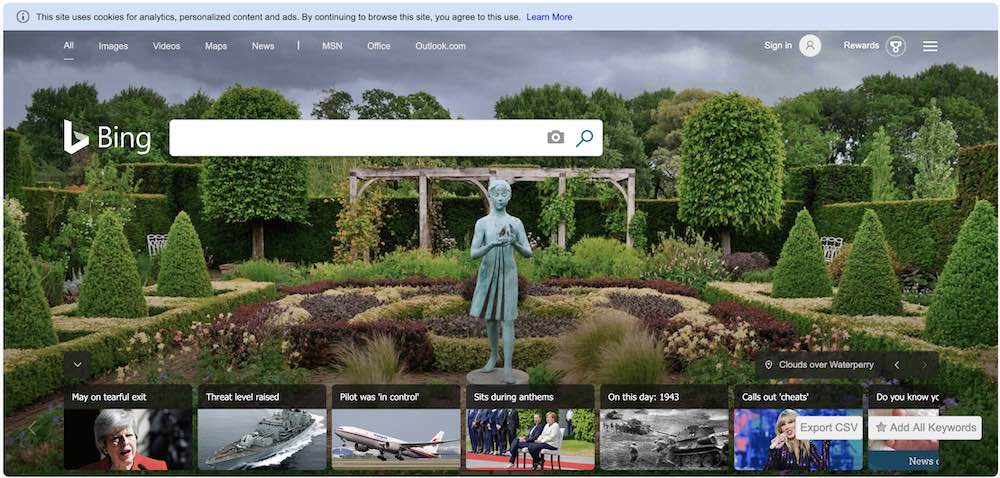
Microsoft’s Bing is the second largest search engine after Google.
It’s easy to use and provides a more visual experience with beautiful daily background photos. Bing is great for video searches, as it displays results as large thumbnails that can be previewed with sound by hovering over them.
Just like Google, Bing is full of internal features like currency conversion, translation, and flight tracking, making it a really versatile tool that holds its own in the global market. Make sure to read our in-depth guide on Bing Webmaster Tools.
While you’re likely familiar with Bing, you might not know that it offers a Rewards scheme. When you shop or search through Bing, you earn points that can be put towards purchasing apps and movies, which is pretty handy.
2. DuckDuckGo
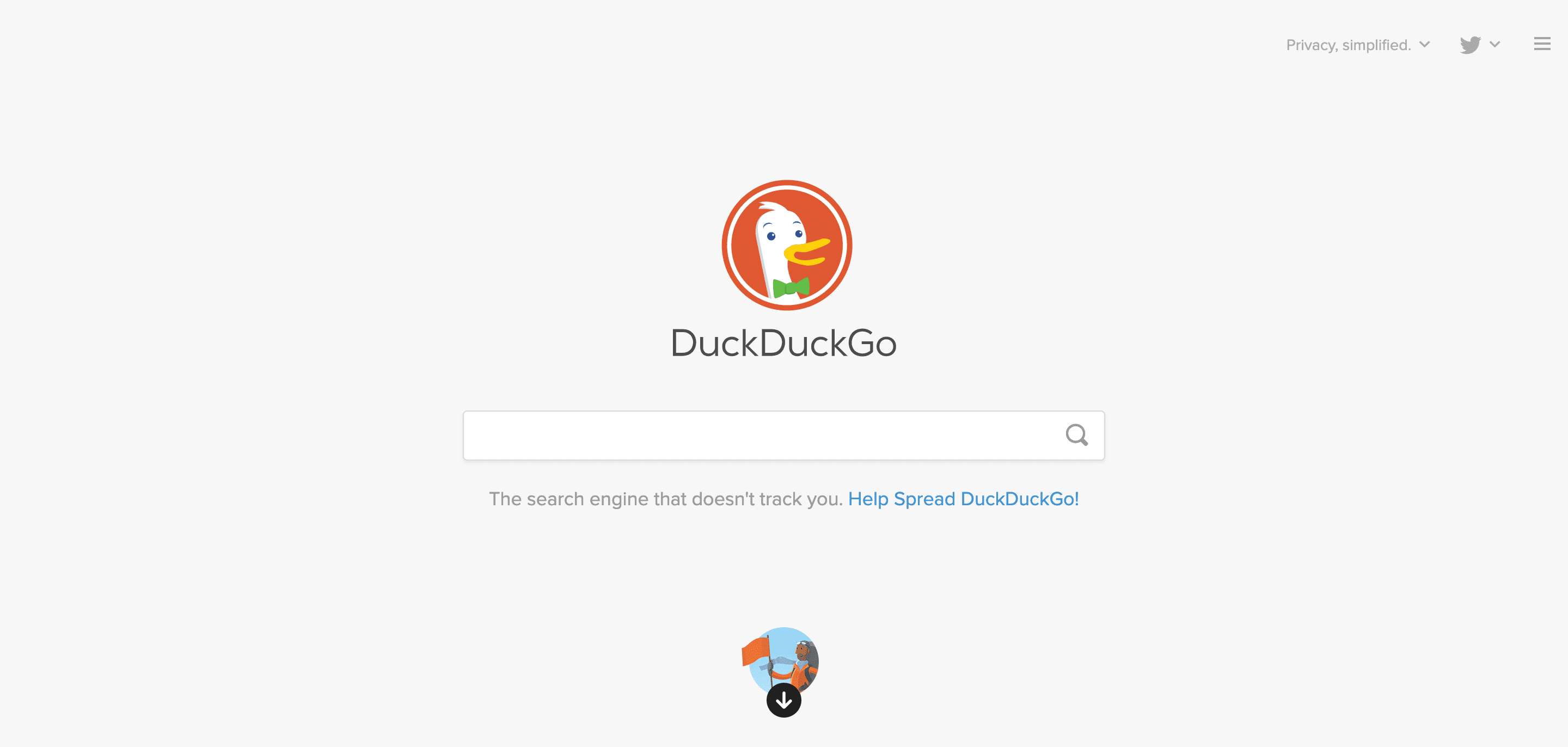
DuckDuckGo is a popular search engine for those who value their privacy and are put off by the thought of their every query being tracked and logged.
It has a very clean interface with minimal ads and infinite scrolling, so the user experience is nice and streamlined. There’s absolutely zero user tracking, and you can even add DuckDuckGo’s extension to your browser to keep your activity private.
The search engine has a really useful feature called bangs, which allows you to search directly within another website from DuckDuckGo by typing a prefix. For example, typing “!ebay magic the gathering” would take you directly to eBay’s search results for the query “magic the gathering”.
3. Yahoo!
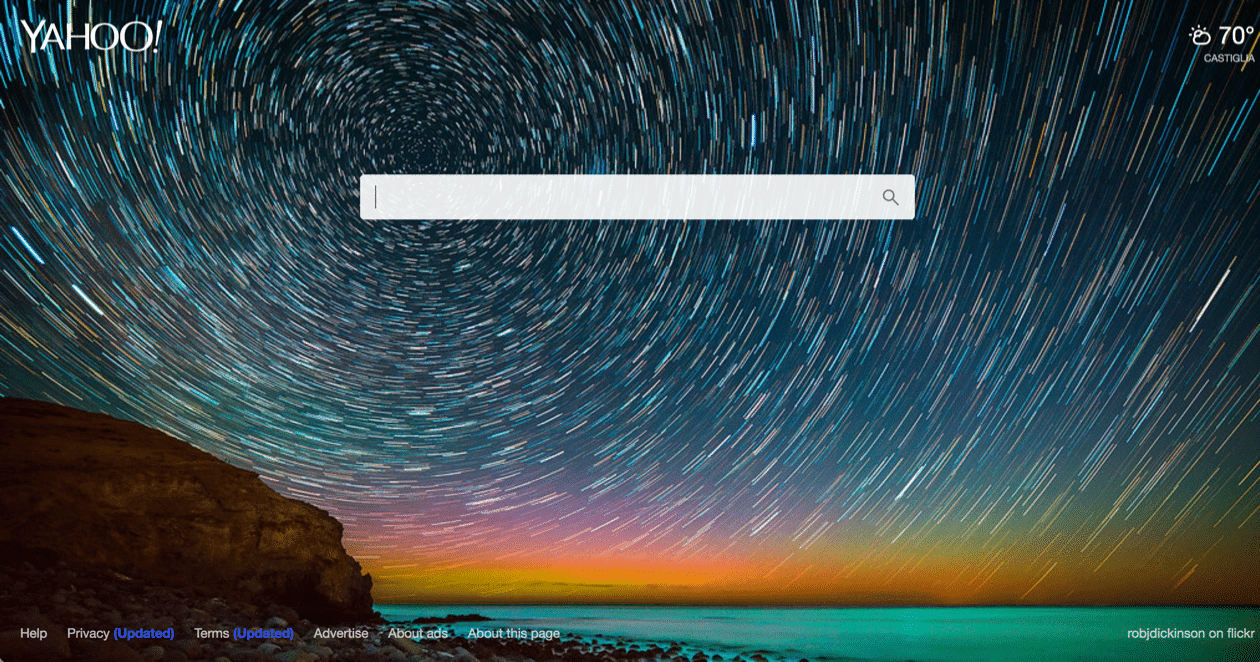
Yahoo has been around for even longer than Google, and while some see it as outdated, it’s still the third most popular search engine worldwide. It’s even the default search engine for Firefox.
One of the great things about Yahoo is that it’s so much more than just a search engine. Yahoo’s web portal offers email, news, online shopping, games and more, giving a well-rounded user experience in one place.
Its integration with Flickr, Yahoo Answers, and Yahoo Finance mean that it offers better image results and huge amounts of information on various topics.
(Suggested reading: 77 Proven Tactics to Drive Traffic to Your Website)
4. Ask
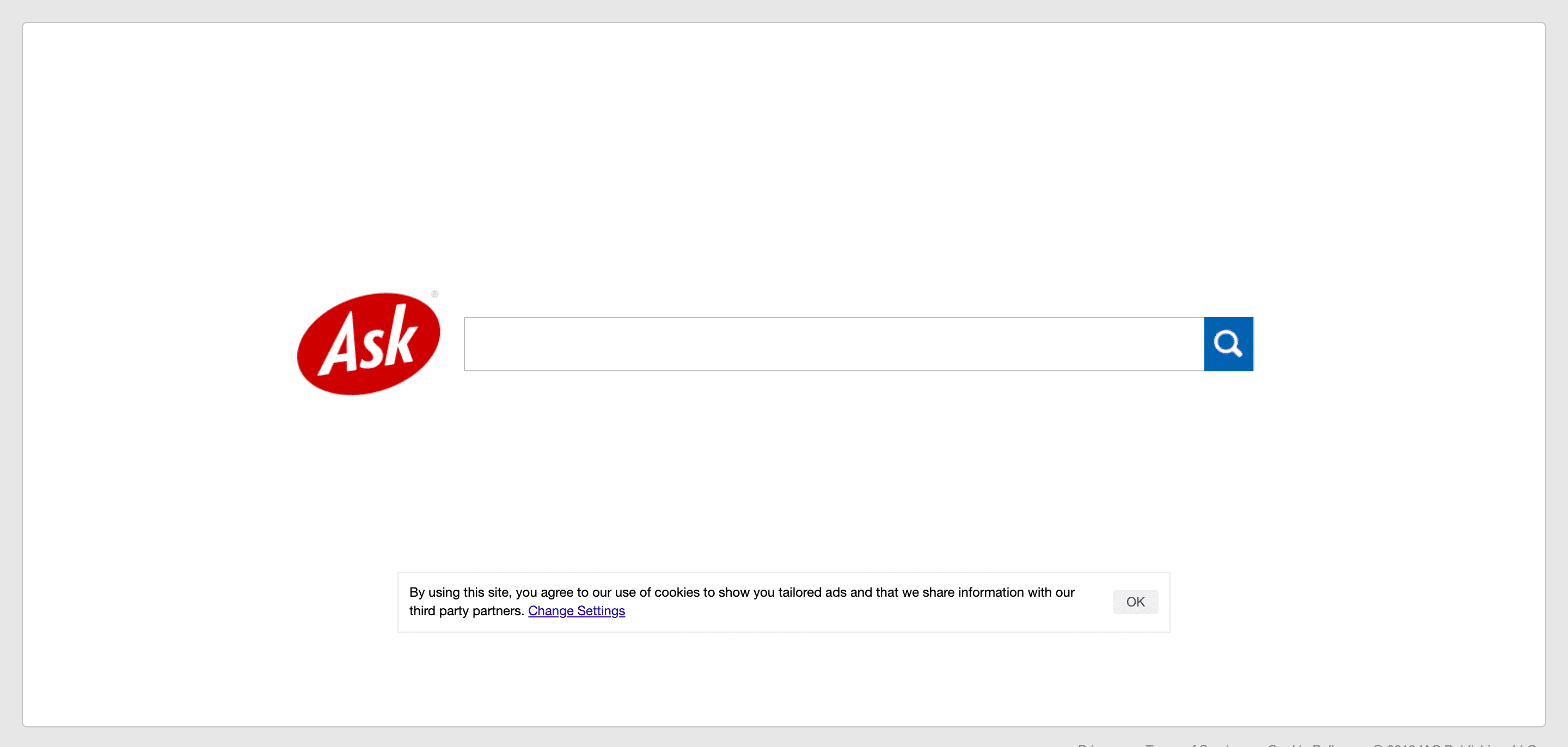
Once known as Ask Jeeves, the simple question-and-answer format of Ask allows for natural-language searches. This makes it very user-friendly, especially for those who are less familiar with search engines such as older computer users.
The search results also display frequently asked questions that are related to your search term, which can provide handy resources and help you to further your search.
5. Baidu

Baidu is the leading search engine in China, with a share of over 70% of China’s internet market. Although in Mandarin, it is strikingly similar to Google. It looks similar in terms of design, it is monetized through ads and it uses rich snippets in search results.
However, Baidu is heavily censored. Certain images and even pro-democracy websites are blocked on the search engine.
6. Brave

Brave is a search engine launched by Brave Software, Inc. in 2021. One of its main concerns is to be privacy-focused: unlike others, the platform doesn’t track users or sell their data.
Brave also stands out for using its own web index to generate search results. Recently, it achieved full independence and no longer relies on other search engines like Google or Bing to answer queries. To the platform that handles 22 million daily queries, this means more control over results and a more transparent relationship with users.
Besides that, Brave’s index, which is made up of billions of pages, it’s “intentionally smaller than that of Google or Bing” since its idea is to avoid low-quality content and spam.
7. WolframAlpha
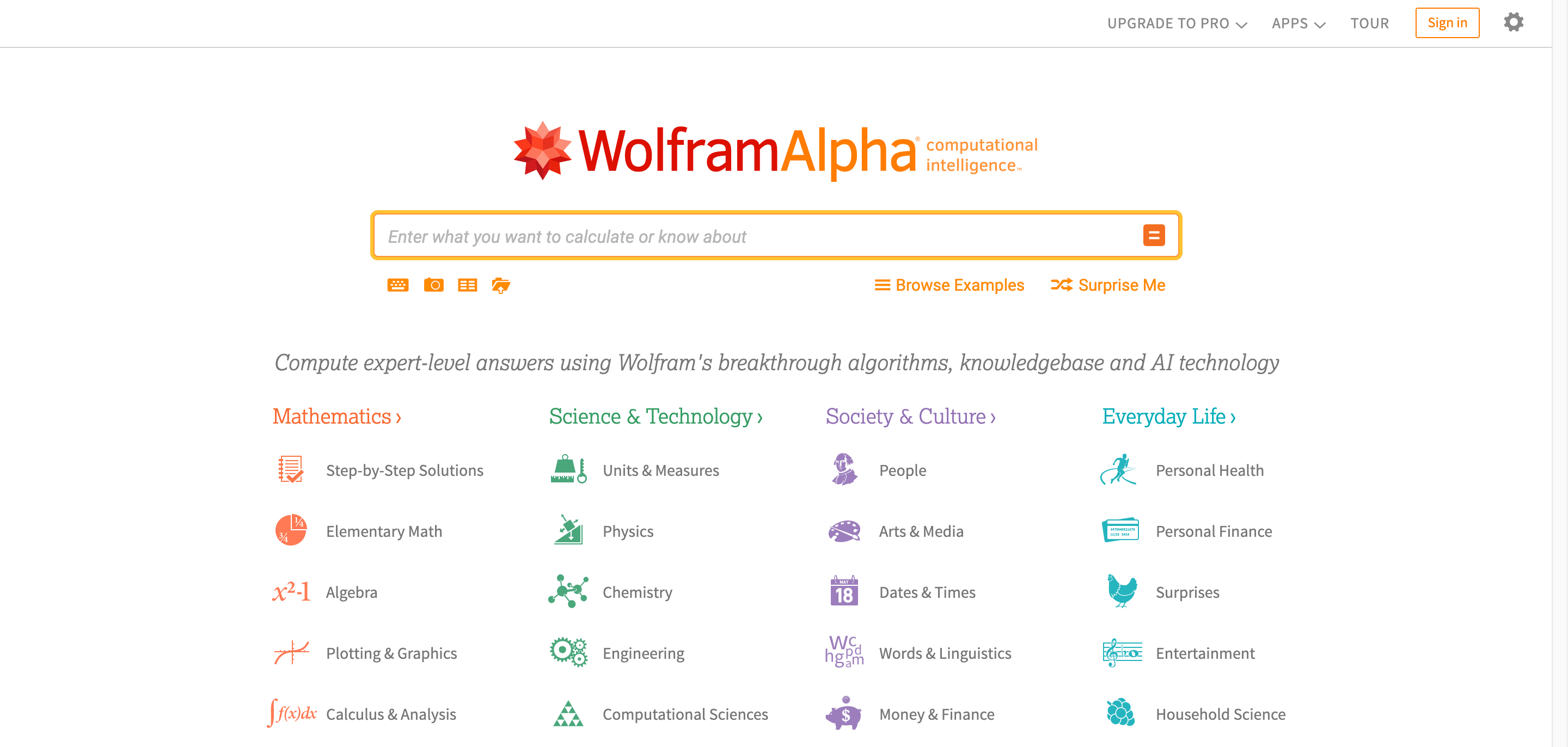
WolframAlpha is a privately owned search engine that allows you to “compute expert-level answers using Wolfram’s breakthrough algorithms, knowledgebase, and AI technology.”
It’s designed to deliver expert knowledge and is categorized into Mathematics, Science & Technology, Society & Culture, and Everyday Life. Within these are various subcategories and useful tools that allow you to compute data, research statistics and find expert answers to your questions (you’ll see an example in a minute).
Along with being a hub of expert knowledge, WolframAlpha doesn’t track your searches, offering peace of mind when it comes to privacy.
8. Boardreader

Boardreader is a search engine for forums and message boards. It allows you to search forums and then filter down results by date and language.
It’s a useful tool for doing content research as it makes it very easy to find content written by real users within the topic. If you aren’t familiar with the niche in order to know the best forum to visit, Boardreader can be a good place to start.
9. StartPage
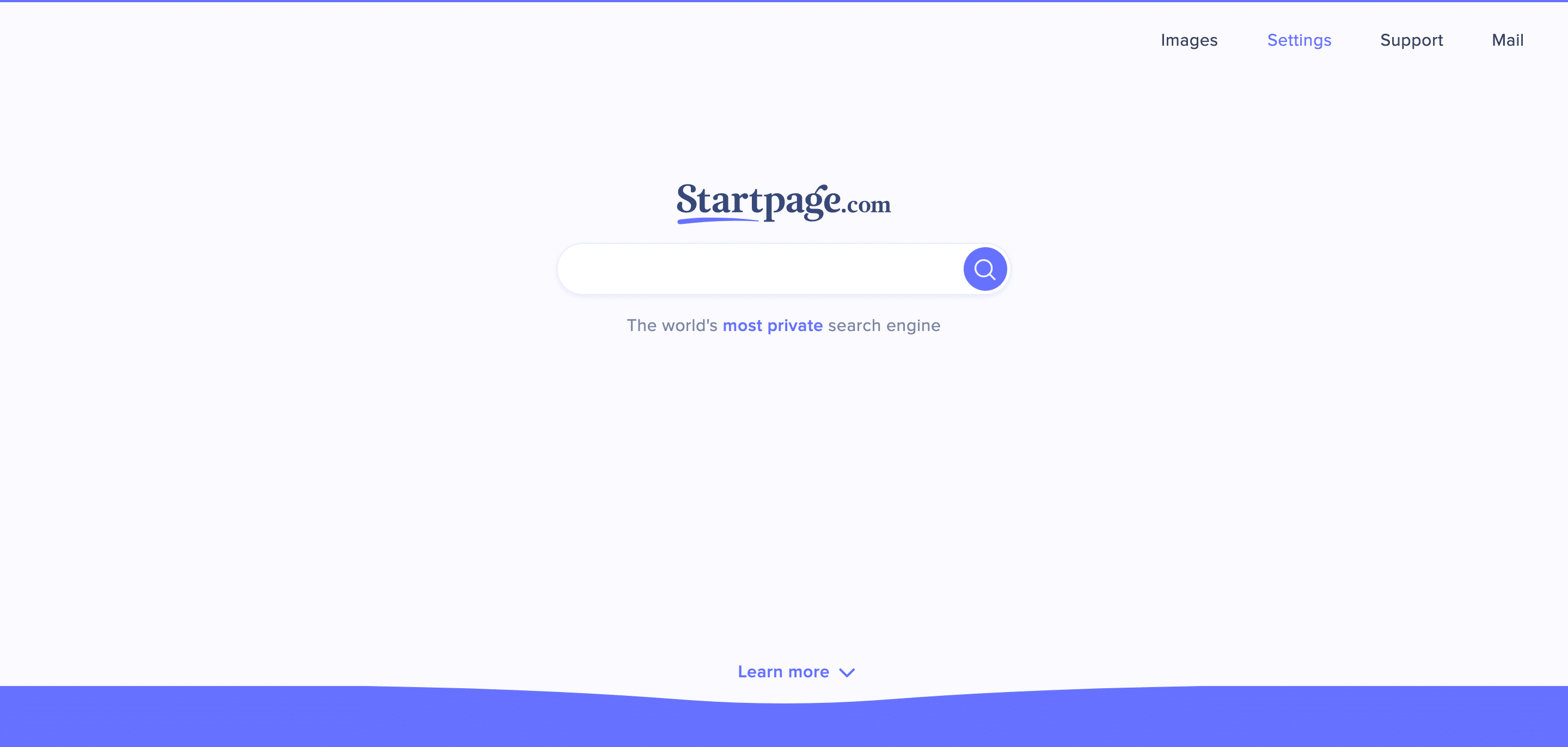
A bit like DuckDuckGo, StartPage was founded with strict user privacy at its core. It doesn’t track or store any of your data. It also doesn’t target ads based on your browsing behaviors.
Startpage claims to be “The world’s most private search engine”. You’ll be able to get similar results to those you’d see from a completely private Google search.
As well as being a search engine, Startpage offers a proxy service that allows you to browse websites anonymously for improved online safety. They even have a custom URL generator that means you can browse without the need to set cookies.
All of this is presented in a smart, clean interface that can be set to various themes, including Night Mode, providing a super-functional user interface.
10. Ecosia

Heavy search engine usage does have an environmental impact on CO2 emissions. That’s where Ecosia comes in: the CO2 neutral alternative search engine.
For every search made (powered by Bing), the revenue generated goes towards its tree-planting scheme. On average, roughly 45 searches are needed to make a single tree.
11. Qwant
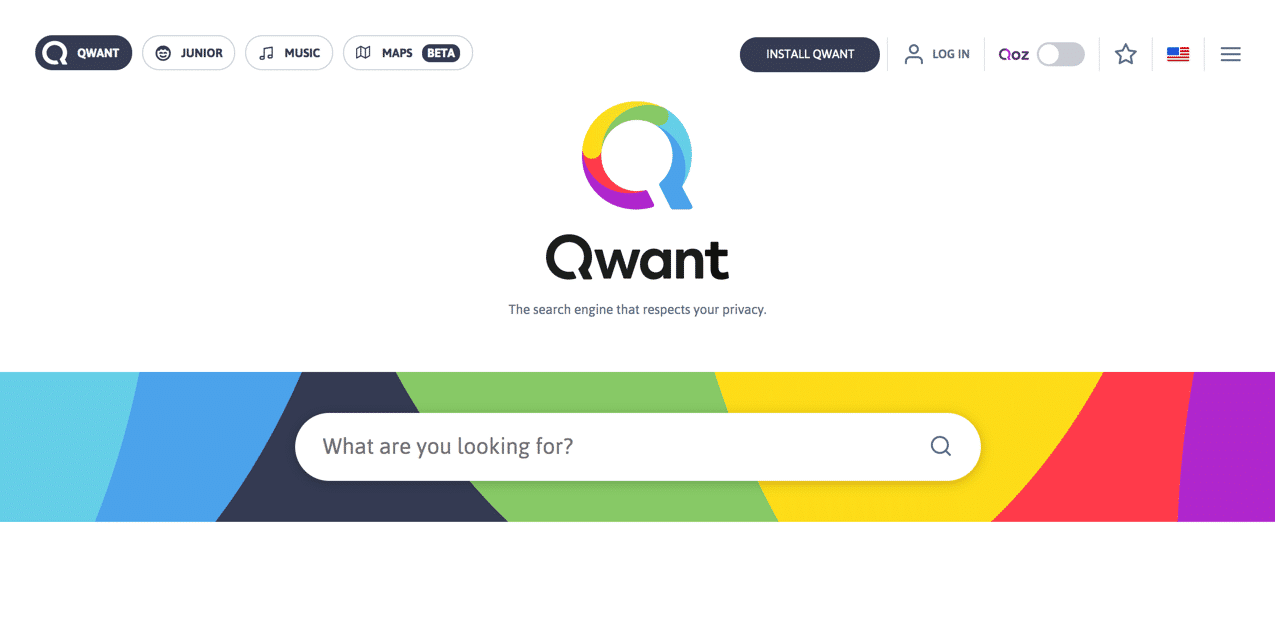
Based in France, Qwant is a privacy-based search engine that won’t record your searches or use your personal details for advertising.
The user-friendly interface categorizes your search results into web, news and social, and there’s even a dedicated music section that uses AI to help you search for lyrics and discover new music.
It uses a quick-search function where you can enter “&” in front of the name of a website (or a dedicated shortcode) to see external search results instantly. For example, “&w” or “&wikipedia” allows you to immediately access results from Wikipedia directly from Qwant.
12. Search Encrypt
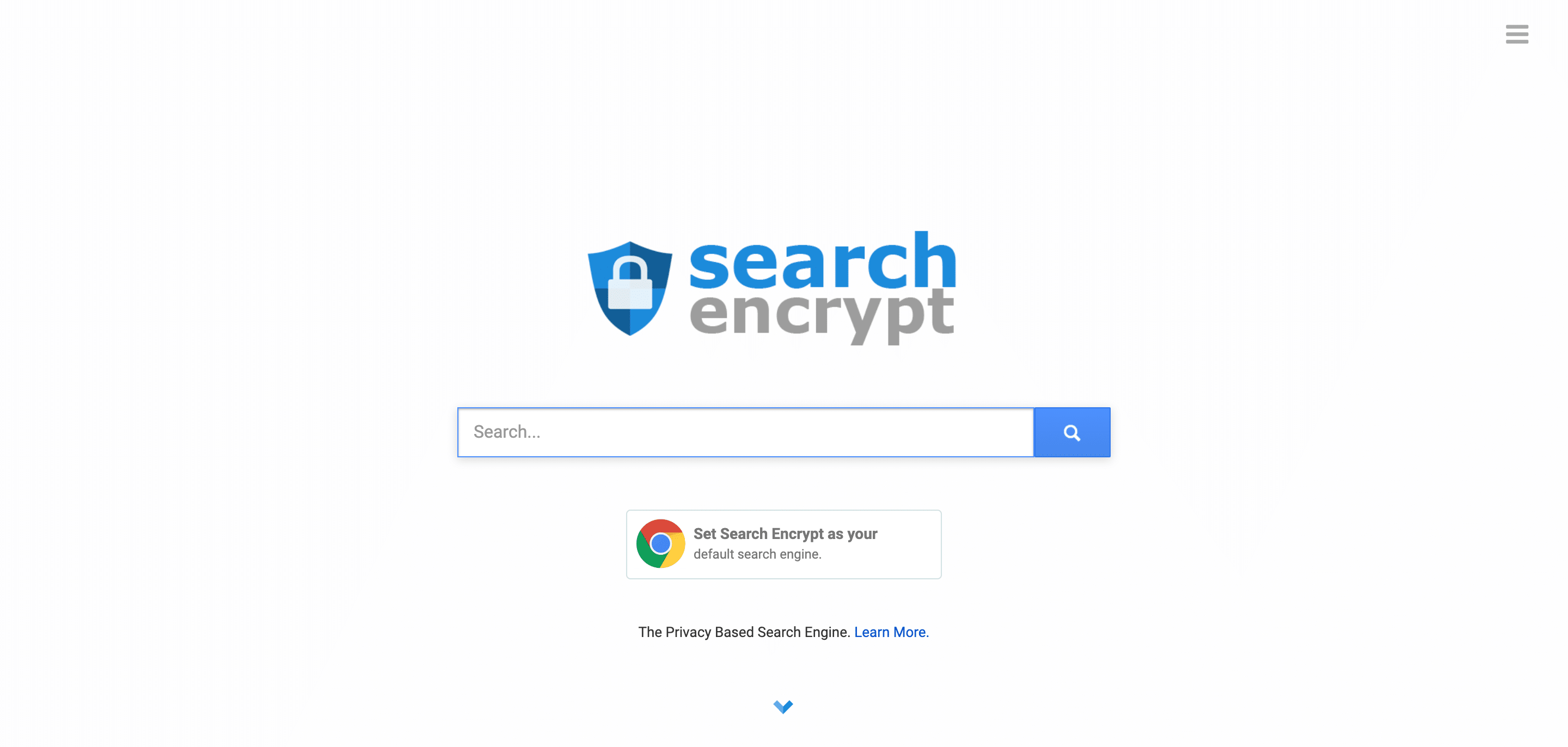
Another privacy-based search engine is Search Encrypt, which uses local encryption to ensure that users’ identifiable information cannot be tracked.
As a metasearch engine, Search Encrypt gets its results from a network of search partners, providing well-rounded results that aren’t personalized to your history.
A really interesting feature of this search engine is that it automatically erases your local browsing history after 15 minutes of inactivity. This means that you never have to worry about your privacy, even if someone else has access to your computer.
13. Yandex
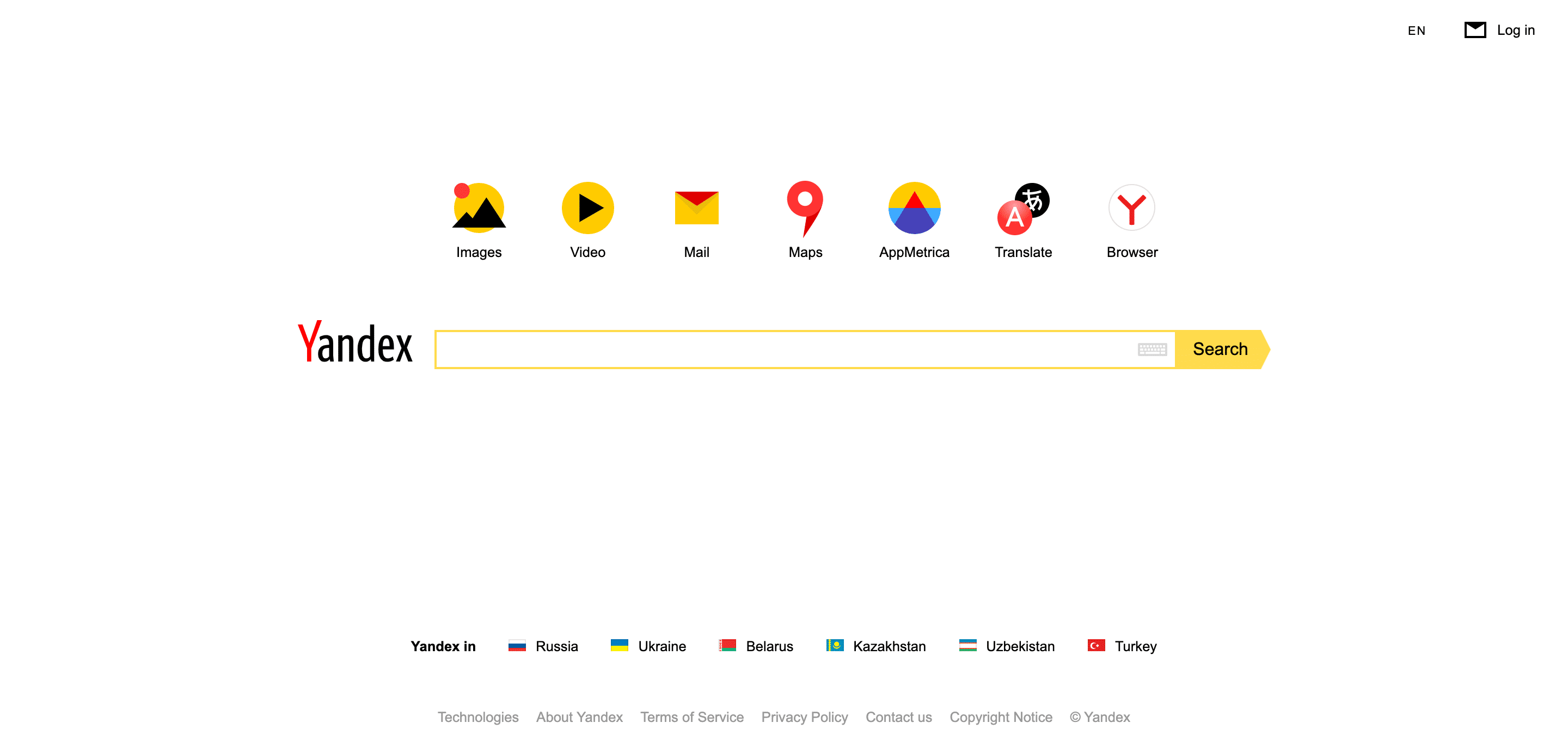
As the fifth most popular search engine worldwide, Yandex is used extensively in its native Russia, where it holds around 60% of the search engine market share.
It provides a very similar service to Google, and you can search websites, images, videos, and news in a user-friendly layout. With additional features including mobile apps, maps, translation, cloud storage and more, Yandex offers just as much functionality but with a cleaner interface.
14. Gibiru
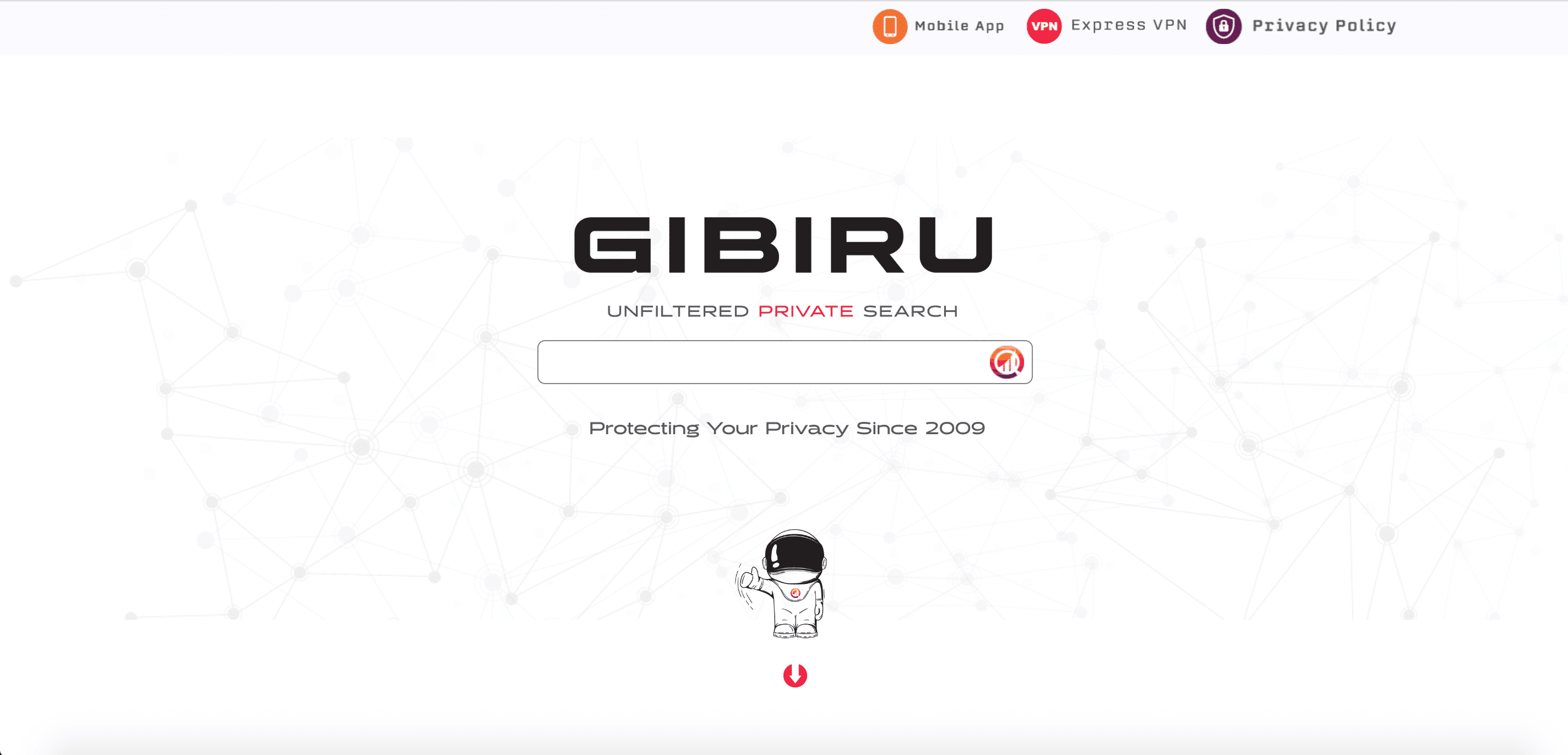
Gibiru’s tagline is “Unfiltered private search” and that’s exactly what it offers.
By downloading its AnonymoX Firefox add-on, all of your searches are sent through a proxy IP address. This provides you with private and unbiased search results and ensures that other computer users won’t be able to track your history.
Search queries aren’t saved on Gibiru’s servers and the records are erased within seconds of the search being performed.
15. Disconnect Search
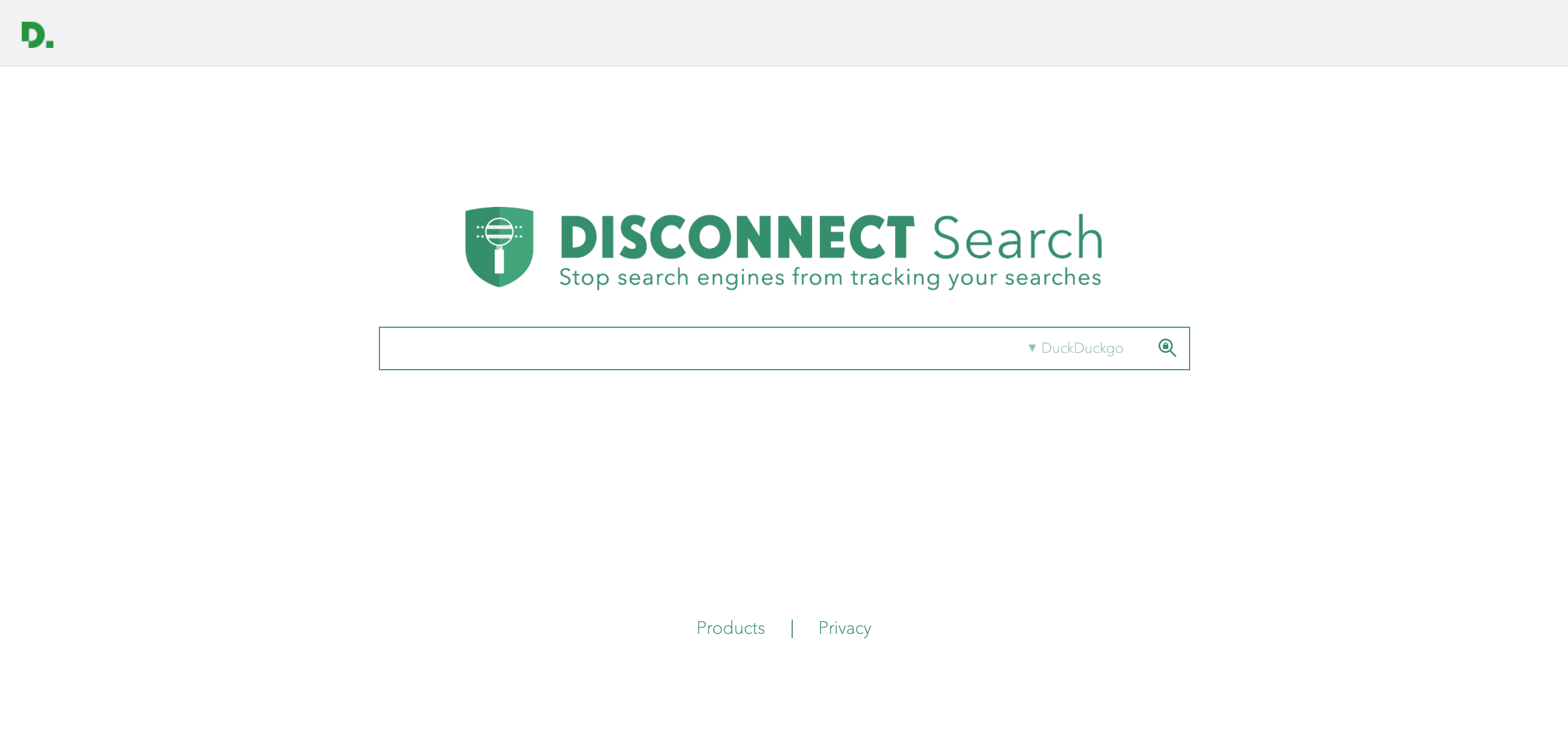
Disconnect allows you to conduct anonymous searches through a search engine of your choice.
When you enter a search term, your query is rerouted and anonymized through Disconnect’s servers before being passed on to the search engine you selected. This allows you to use your favorite search engine without any privacy issues.
Disconnect also offers browser extensions and apps that allow you to block tracking sites, load pages faster, view advertising requests and many more privacy-based functions.
16. Swisscows
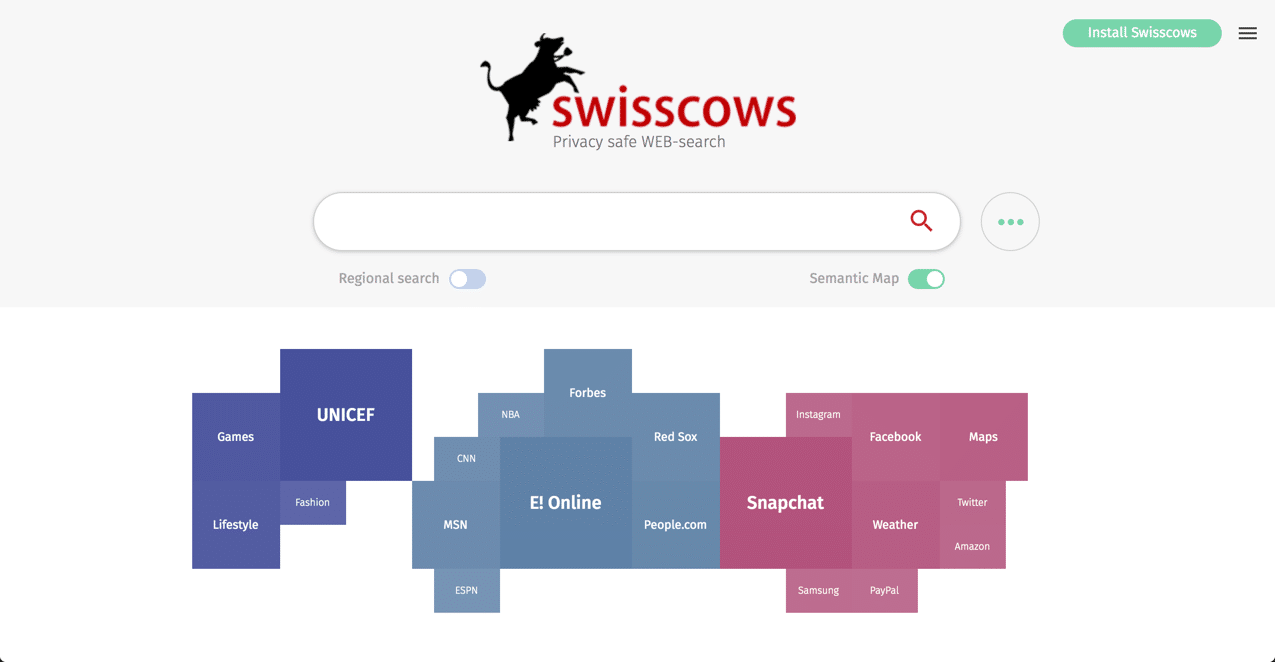
Swisscows provides fully encrypted searches to protect your privacy and security. It doesn’t store personal data, IP addresses or search queries, and its servers are based in Switzerland, which has some of the world’s strictest privacy policies.
It’s particularly popular with parents who want to give their children a safe search experience, as its built-in filter for pornography and violence can’t be overridden.
It uses semantic information recognition to offer intuitive answers to search queries, and data pools to generate answers quickly and efficiently. The innovative semantic map shows other relevant or popular queries, helping to give you even more information.
17. Lukol
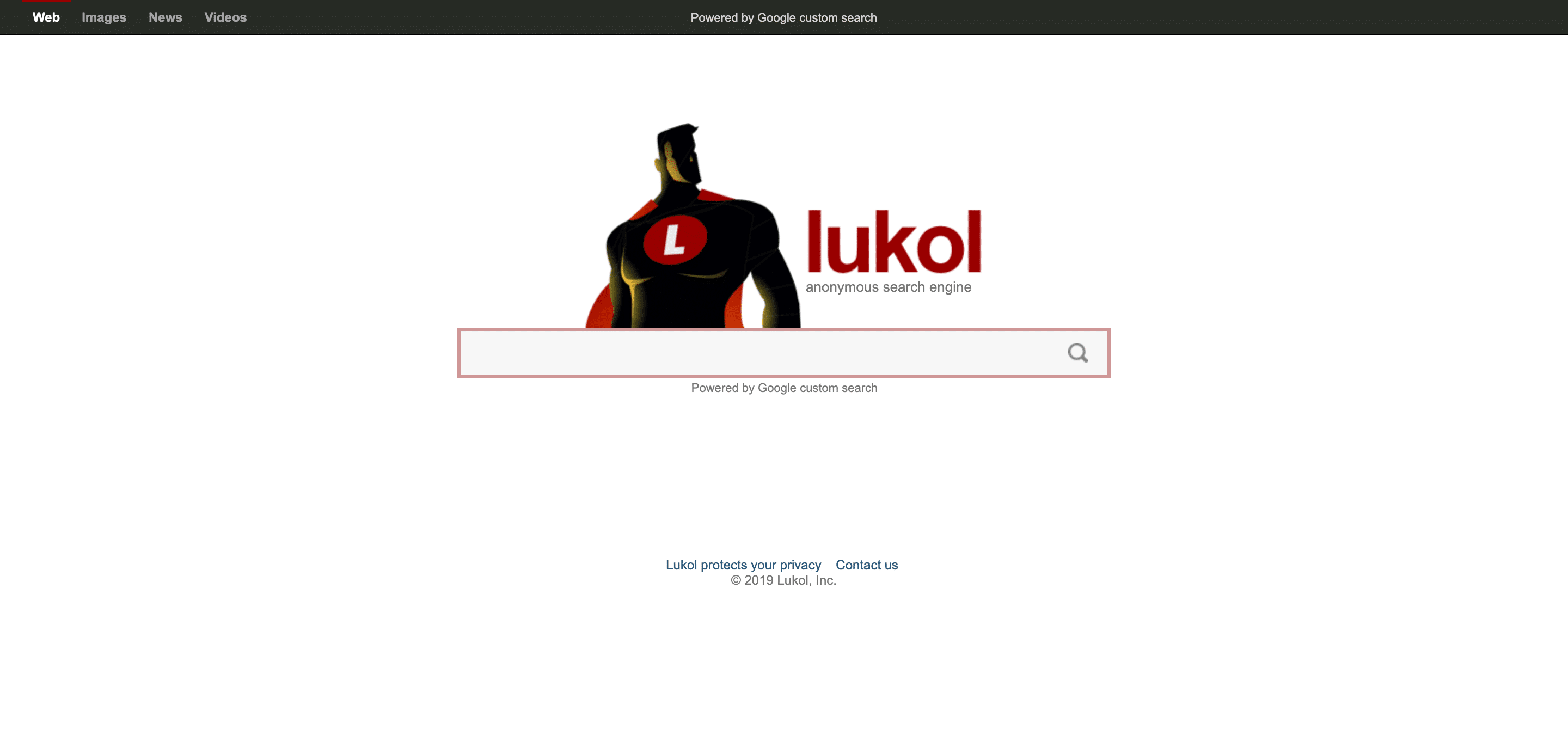
Lukol is an anonymous search engine that serves results from Google but maintains your privacy by removing any traceable elements.
This means that you can still benefit from Google’s search power without worrying about being tracked. Lukol ensures the full anonymity of your searches and helps to keep you safe by protecting you from misleading or inappropriate sites.
In terms of functionality, it’s quite a simple search engine. You can choose from web, images, news, and videos for your search, but there aren’t any options to filter results.
18. MetaGer

MetaGer offers “Privacy Protected Search & Find” through its anonymized search. They are a nonprofit organization, so they have nothing to gain by tracking your searches, and they only use green energy, adding to the sense of trust.
MetaGer is a metasearch engine that queries up to 50 external search engines, giving variety and depth to its results. It does not take clickthrough rate into account when it processes a query, so results are unfiltered and unbiased. They even offer maps and route-planning without tracking your location.
You can also download a plugin that sets MetaGer as your default search engine and start page to ensure your searches always remain private.
19. Oscobo
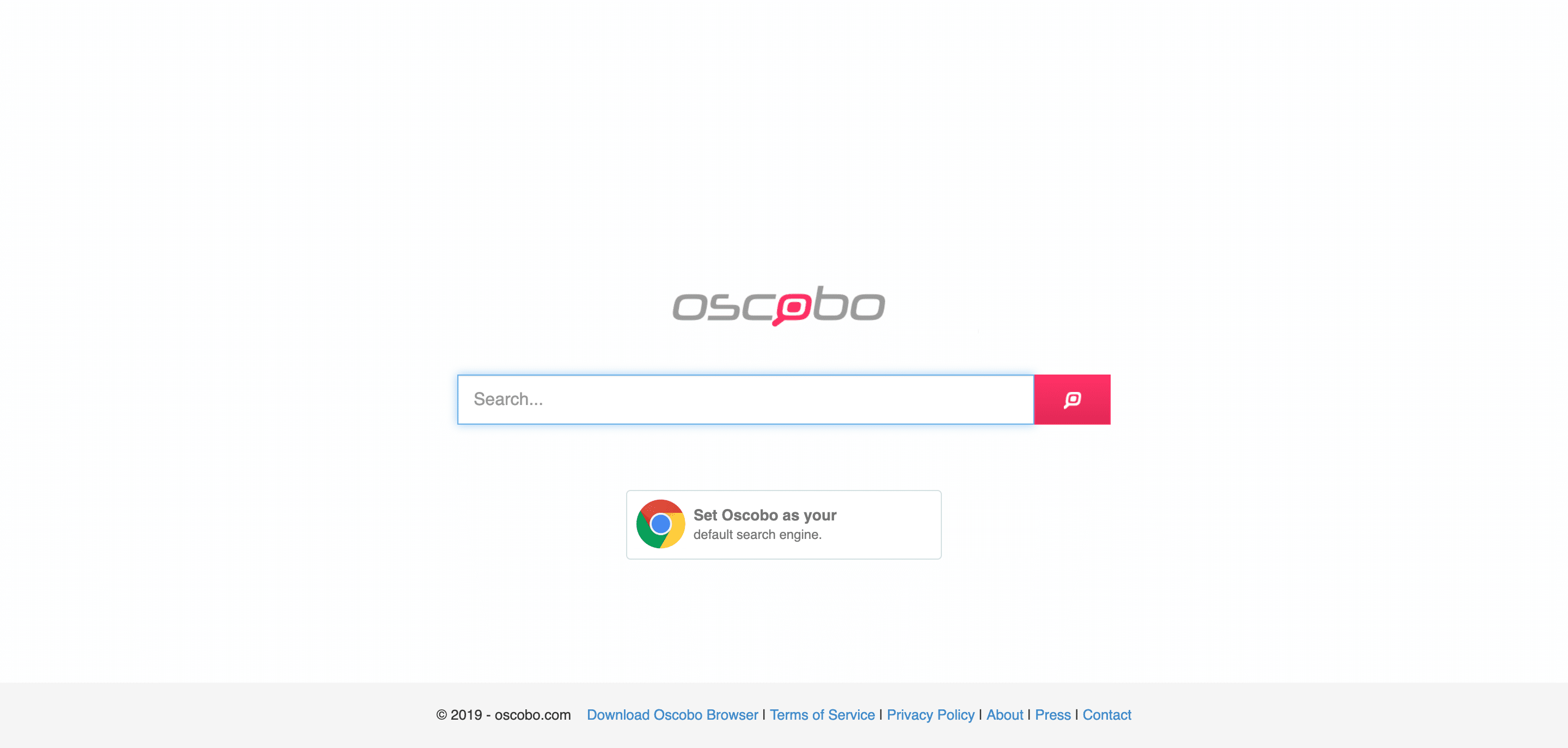
Oscobo is a search engine that protects your privacy while you search the web. By not using any third-party tools or scripts, your data is protected from hacking and misuse.
By encrypting all traffic, it delivers anonymous search results without any form of tracking, including IP addresses and cookies. Oscobo won’t send the search term to the site that you click on or share your personal data or search history.
You can search by web, images, videos, and maps for great usability. There is also a Chrome extension that allows you to search privately from the Chrome bar for easy access to secure queries.
What Is the Best Search Engine Other Than Google?
There is zero doubt that Google is the biggest and arguably the best search engine out there, thanks to its powerful algorithms and AI.
So, choosing to browse the internet without using Google may seem like an odd thing to try. But being the best search engine comes at a cost.
It is well-known that Google personalizes your browsing experience at the cost of sharing your personal data and by allowing Google to track you across the internet. For some, this personalization may become annoying at least.
What’s more, many of these alternatives have different features and approaches to privacy to offer you. So go ahead and give one a try, you might even end up with better search results.
Here are some ways you can use these alternative search engines:
Perform a Bang Search on DuckDuckGo
A DuckDuckGo bang is a shortcut that quickly takes you to search results on other sites.
For example, when you want to search on another site (like Wikipedia, Amazon, GitHub, Stack Overflow ect) just add a ! to the search bar:
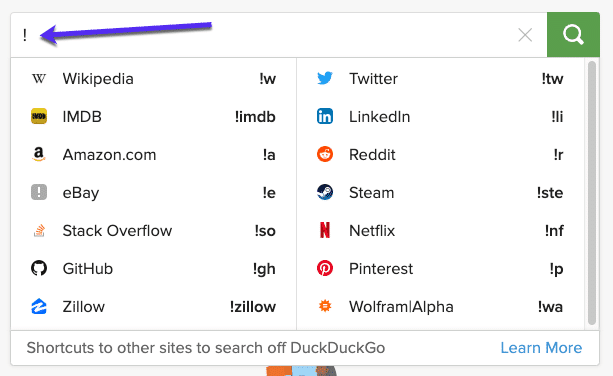
You’ll be able to select from a large list of target sites and perform a search. The bang will then take you directly to the search results page on the website you just defined. Useful for when you know you want to search on another site.
Check if Websites are Down on DuckDuckGo
Another one from DuckDuckGo here. You can quickly and easily check whether a website is down by searching: “is X down”:

Preview Images in the Results on Bing
Just hover over an image in the search results to get a preview of the image:

If you hover over thumbnail images in Bing Video Search, you’ll also get a short preview of the video. This helps you to quickly check whether a clip is relevant without visiting the website.
Compare Websites in WolframAlpha
Using WolframAlpha, you can do a quick website comparison of any web address.
For example, searching “facebook.com vs twitter.com”:
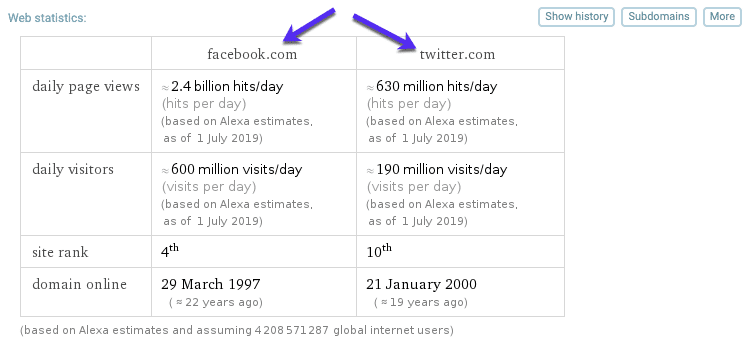
Data is pulled from right from Alexa’s database to give you a quick high-level view of two websites.
What Is the Best Search Engine for Privacy?
So you want to search the web without compromising your privacy? Then you better use a private search engine.
But What Is a Private Search Engine?
A private search engine is a search engine that does not track its users’ data and delivers search results with additional protection and levels of data privacy.
The best search engines for privacy are:
- DuckDuckGo
- StartPage
Let’s look at them a little closer in terms of protecting your privacy:
Best Private Search Engine #1: DuckDuckGo
DuckDuckGo includes a detailed and transparent privacy policy. However, if 100% privacy is your goal, you should know that it does save search histories. DuckDuckGo claims that this is “non-personal” and aggregated data, so your searches cannot be traced back directly to you.
You can read the full DuckDuckGo privacy policy here.
Best Private Search Engine #2: StartPage
StartPage’s privacy policy is simple and to the point: “We don’t track you. We don’t profile you. Period.” When using this private search engine, metadata (personal information like your IP address) is removed from your search query. This anonymous search request is then sent to Google, then the results are sent to you via StartPage without revealing any of your private data.
You can read the full StartPage privacy policy here.
Want to learn how to drive traffic to your website using SEO? Check out our video:
Summary
This is just a snapshot of the world of alternative search engines and what they can offer.
Whether you’re looking for more privacy, improved usability, or unbiased results, there are plenty of options out there to choose from. Try a few out and see how you get on. You never know; you might find a new favorite. Or a Google sidekick, at least.


